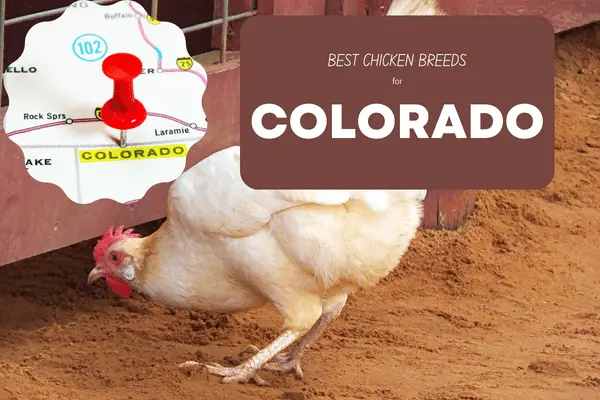Raising chickens in Colorado can be a rewarding experience, providing fresh eggs and a source of entertainment for the whole family.
However, with a wide variety of chicken breeds to choose from, it can be difficult to know which ones will thrive in the state’s unique climate and environment.
In this article, we will explore the best chickens for Colorado and provide you with the information you need to make an informed decision.
Considerations for Raising Chickens in Colorado
Before we dive into the specific breeds of chickens that are well-suited for Colorado, it’s important to understand the unique considerations that come with raising chickens in this state. Colorado is known for its high altitude and wide range of temperatures, with hot summers and cold winters. These factors can have a significant impact on the health and well-being of your chickens, and it’s important to choose breeds that can tolerate these conditions.
Another important consideration is the availability of natural predators in Colorado. Hawks, foxes, and bears are all common in the state, and they can pose a serious threat to your chickens. It’s important to choose breeds that are known for their hardiness and ability to fend off predators.
Let’s find the best Colorado chicken breeds.
Breed
Egg Production
Temperament
Varieties
Dual Purpose
Weight
Recognized by APA
Rhode Island Reds
High
Friendly and docile
Standard and Bantam
Yes
4-6 lbs
Yes
Plymouth Rocks
High
Friendly and docile
Standard and Bantam
Yes
5-7 lbs
Yes
Orpingtons
High
Friendly and docile
Standard and Bantam
Yes
5-7 lbs
Yes
Sussex
High
Friendly and docile
Standard and Bantam
Yes
5-7 lbs
Yes
Australorp
High
Friendly and docile
Standard and Bantam
Yes
5-7 lbs
Yes
Leghorn
High
Active and Alert
Standard and Bantam
Yes
3-4 lbs
Yes
Marans
High
Friendly and docile
Standard and Bantam
Yes
4-6 lbs
Yes
Welsummers
High
Friendly and docile
Standard and Bantam
Yes
Rhode Island Red
Rhode Island Reds are a popular breed of chicken known for their excellent egg-laying ability, hardiness, and friendly personalities. They are considered a dual-purpose breed, meaning they are suitable for both egg production and meat production. Recognized by the American Poultry Association (APA) in 1904, Rhode Island Reds are a classic breed that has been a staple in the American backyard for over a century.
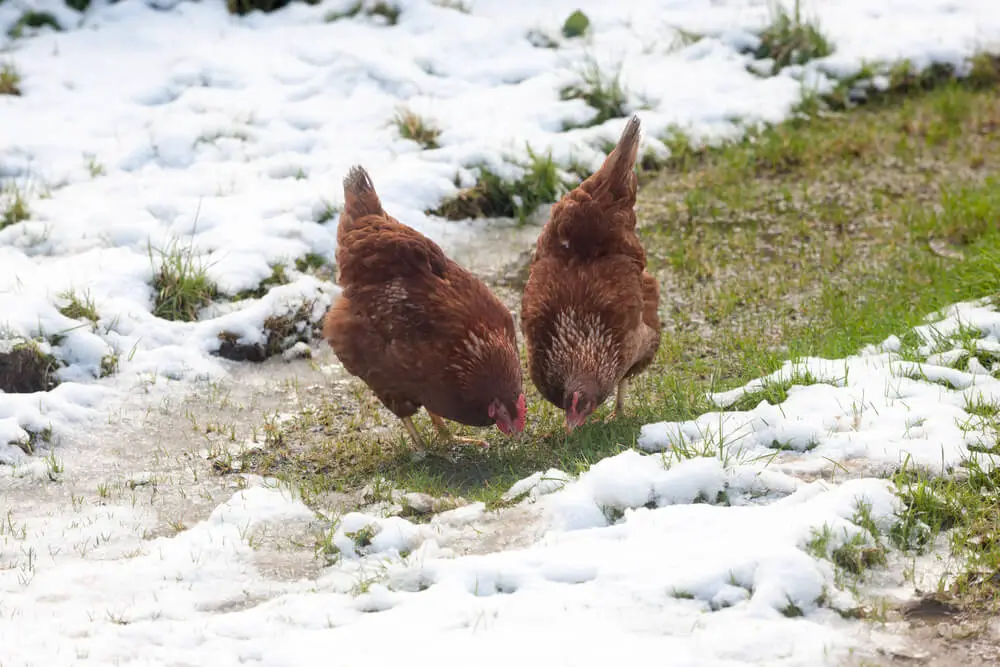
One of the key characteristics of Rhode Island Reds is their egg production. They are considered to be one of the best layers among the heavy breeds, laying an average of 250-280 brown eggs per year. They are also known for their consistent laying habits, making them a reliable choice for backyard egg production.
In terms of temperament, Rhode Island Reds are known for their friendly and docile personalities. They are not aggressive and are easy to handle, making them a great choice for families with children. They are also hardy birds that can tolerate a wide range of temperatures and are not prone to health issues.
There are a few varieties of Rhode Island Reds recognized by the APA, including the standard Rhode Island Red, the Rhode Island Red Bantam, and the Rhode Island Red Light. The standard Rhode Island Red is the most common variety, while the Rhode Island Red Bantam is a smaller version of the breed and the Rhode Island Red Light is a lighter version that is bred for meat production.
In terms of being dual-purpose, Rhode Island Reds are known for their meat quality as well. They have a good meat-to-bone ratio and are considered to be a good choice for backyard meat production. Their meat is considered to be flavorful and moist.
As the famous chicken farmer and author Joel Salatin once said,
‘The chicken is an incredibly efficient converter of forage into protein. It’s like a little protein factory on legs.'”
Plymouth Rock
Plymouth Rocks, also known as “Rocks“, are a popular heritage breed of chicken known for their hardiness, friendly personalities, and excellent egg-laying ability. They are considered a dual-purpose breed, meaning they are suitable for both egg production and meat production. Recognized by the American Poultry Association (APA) in 1874., Plymouth Rocks are a classic breed that has been a staple in the American backyard for over a century.
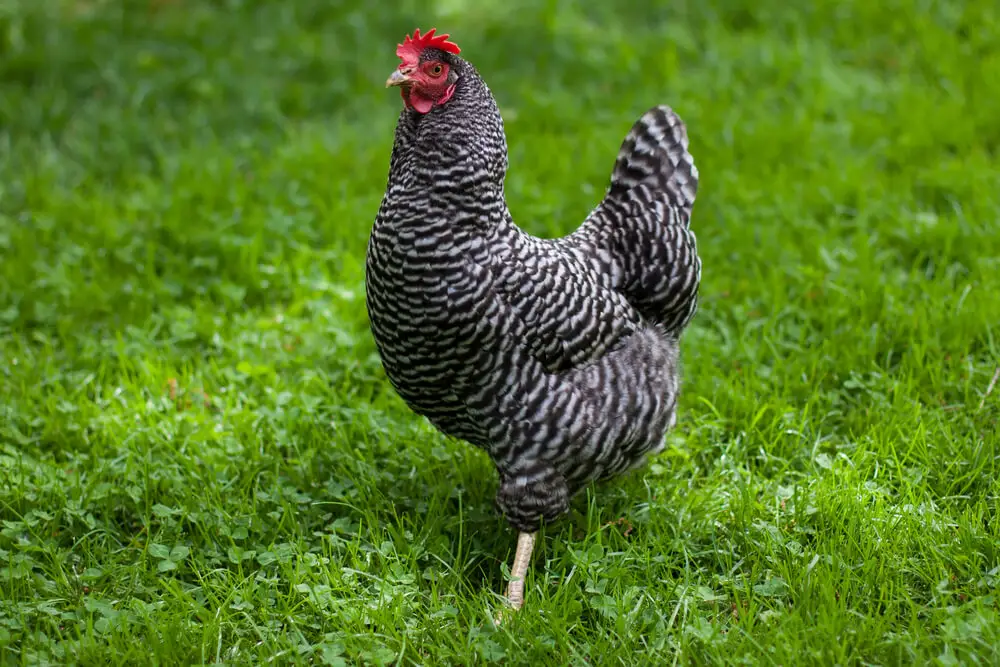
One of the key characteristics of Plymouth Rocks is their egg production. They are considered to be excellent layers, laying an average of 200-250 brown eggs per year. They are also known for their consistent laying habits, making them a reliable choice for backyard egg production. Additionally, Plymouth Rock hens are known for being excellent mothers and are known to be great at brooding and raising their own chicks.
In terms of temperament, Plymouth Rocks are known for their friendly and docile personalities. They are not aggressive and are easy to handle, making them a great choice for families with children. They are also hardy birds that can tolerate a wide range of temperatures and are not prone to health issues.
There are a few varieties of Plymouth Rocks recognized by the APA, including barred, blue, buff, Colombian, partridge, silver-penciled, and white.
In terms of being dual-purpose, Plymouth Rocks are known for their meat quality as well. They have a good meat-to-bone ratio and are considered to be a good choice for backyard meat production. Plymouth Rocks are also known for their hardiness and are able to tolerate cold weather better than other breeds.
Orpington
Orpingtons are a large, docile breed that is well-suited for the Colorado climate. Orpingtons are a heritage breed of chicken known for their hardiness, friendly personalities, and excellent egg-laying ability. They are considered a dual-purpose breed, meaning they are suitable for both egg production and meat production. Recognized by the American Poultry Association (APA) in 1902, Orpingtons are a classic breed that have been a staple in the American backyard for over a century.
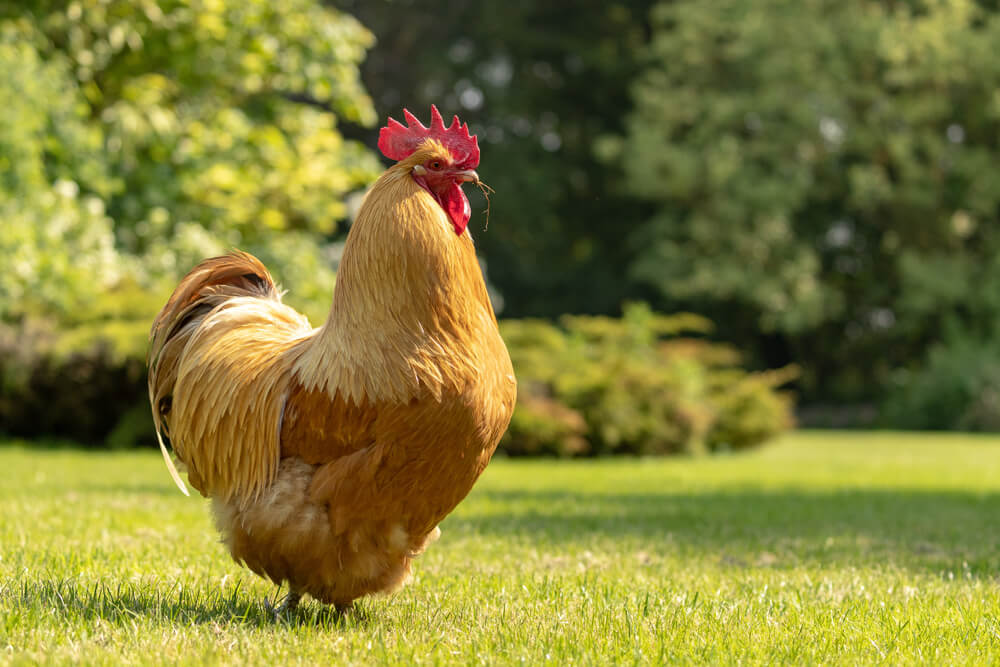
One of the key characteristics of Orpingtons is their egg production. They are considered to be excellent layers, laying an average of 200-220 large, brown eggs per year. They are also known for their consistent laying habits, making them a reliable choice for backyard egg production. Additionally, Orpington hens are known for being excellent mothers, and are known to be great at brooding and raising their own chicks.
In terms of temperament, Orpingtons are known for their friendly and docile personalities. They are not aggressive and are easy to handle, making them a great choice for families with children. They are also hardy birds that can tolerate a wide range of temperatures and are not prone to health issues.
There are a few varieties of Orpingtons recognized by the APA, including the standard Orpington, the Orpington Bantam, and the Buff Orpington. The standard Orpington is the most common variety, while the Orpington Bantam is a smaller version of the breed and the Buff Orpington is a variety that is characterized by its rich, golden-buff feathers.
In terms of being dual-purpose, Orpingtons are known for their meat quality as well. They have a good meat-to-bone ratio and are considered to be a good choice for backyard meat production. Their meat is considered to be flavorful and moist. Orpingtons are also known for their hardiness and are able to tolerate cold weather better than other breeds.
Sussex
The Sussex chicken is a dual-purpose breed that is known for its egg production and meat quality. This breed is recognized by the American Poultry Association and is available in several different varieties.
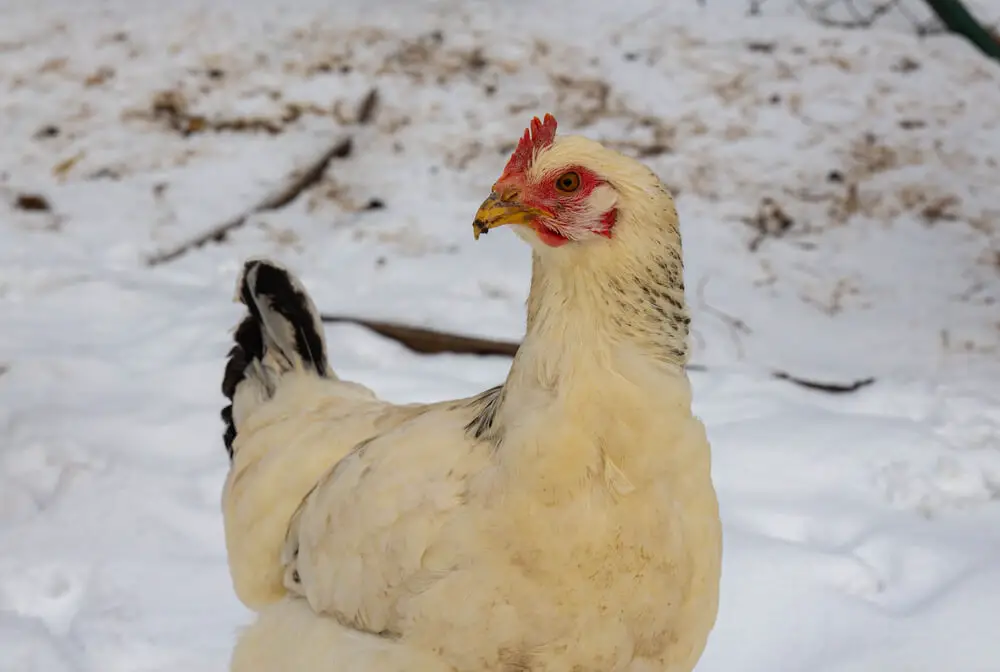
One of the most popular varieties of Sussex chickens is the Speckled Sussex. This variety is known for its beautiful speckled plumage and friendly temperament. The Speckled Sussex is a great layer, producing around 230 eggs per year. They are also a good size for meat production, with roosters weighing around 8-9 pounds and hens weighing around 6-7 pounds.
Another popular variety of Sussex chickens is the Red Sussex. This variety is known for its beautiful red plumage and friendly temperament.
The Light Sussex is another variety of this breed, known for its white plumage and friendly temperament.
The Coronation Sussex is a newer variety of this breed, known for its black and white plumage and friendly temperament. This variety is also a great layer, producing around 200 eggs per year and with a similar weight as the previous three varieties.
In terms of temperament, Sussex chickens are known to be friendly and easy to handle. They are also hardy birds that can tolerate a wide range of weather conditions. They are a great choice for backyard flocks and small homesteads.
Australorp
The Australorp chicken is a dual-purpose breed that is known for its exceptional egg production and meat quality. This breed is recognized by the American Poultry Association in 1929.
One of the most popular varieties of Australorp chickens is the Black Australorp. This variety is known for its shiny black plumage and friendly temperament. The Black Australorp is an exceptional layer, producing around 300 eggs per year and often continuing to lay well into their second year. They are also a good size for meat production, with roosters weighing around 9-10 pounds and hens weighing around 7-8 pounds.
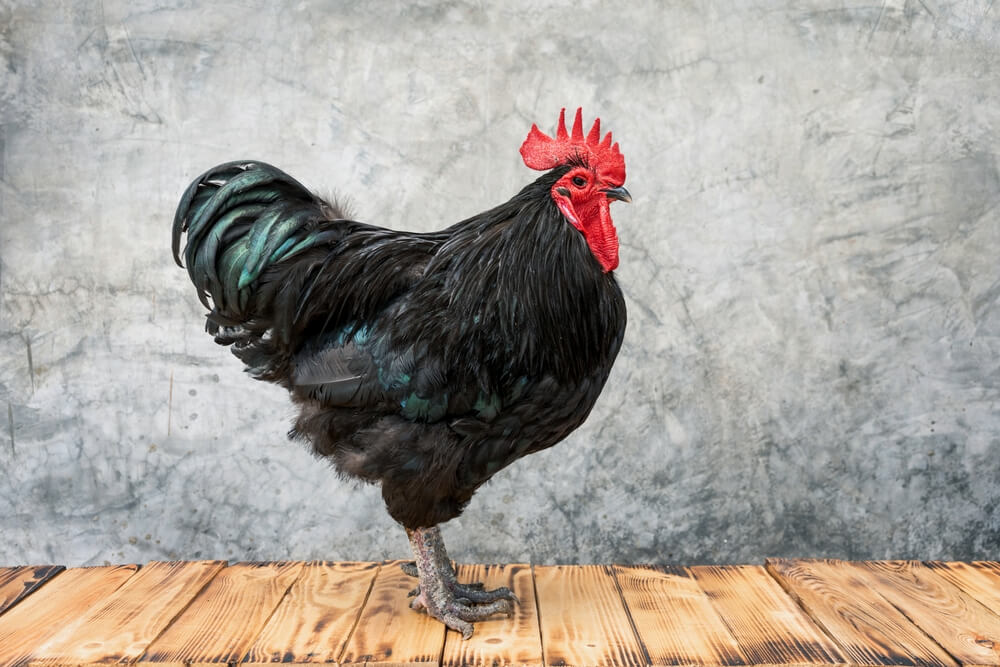
For sure one of the best egg-laying chickens for Colorado!
In terms of temperament, Australorp chickens are known to be friendly and easy to handle. They are also hardy birds that can tolerate a wide range of weather conditions. They are a great choice for backyard flocks and small homesteads.
One of the most notable characteristics of the Australorp is their ability to lay eggs consistently throughout the year, making them a great choice for those looking for a steady supply of eggs. They are also hardy birds that can tolerate cold weather, making them a great choice for those in colder climates.
Overall, the Australorp chicken is a great choice for those looking for a dual-purpose breed that is known for its exceptional egg production and meat quality.
The friendly temperament and hardiness of this breed make them a great choice for backyard flocks and small homesteads.
Leghorn
The Leghorn chicken is a dual-purpose breed known for its exceptional egg production and lean meat. Recognized by the American Poultry Association in 1894, this breed is available in several different varieties.
One of the most popular varieties of Leghorn chickens is the White Leghorn. This variety is known for its bright white plumage and active disposition. White Leghorns are highly productive layers, producing around 280 eggs per year on average. They are also relatively lightweight, with roosters weighing around 5-6 pounds and hens weighing around 4-5 pounds.
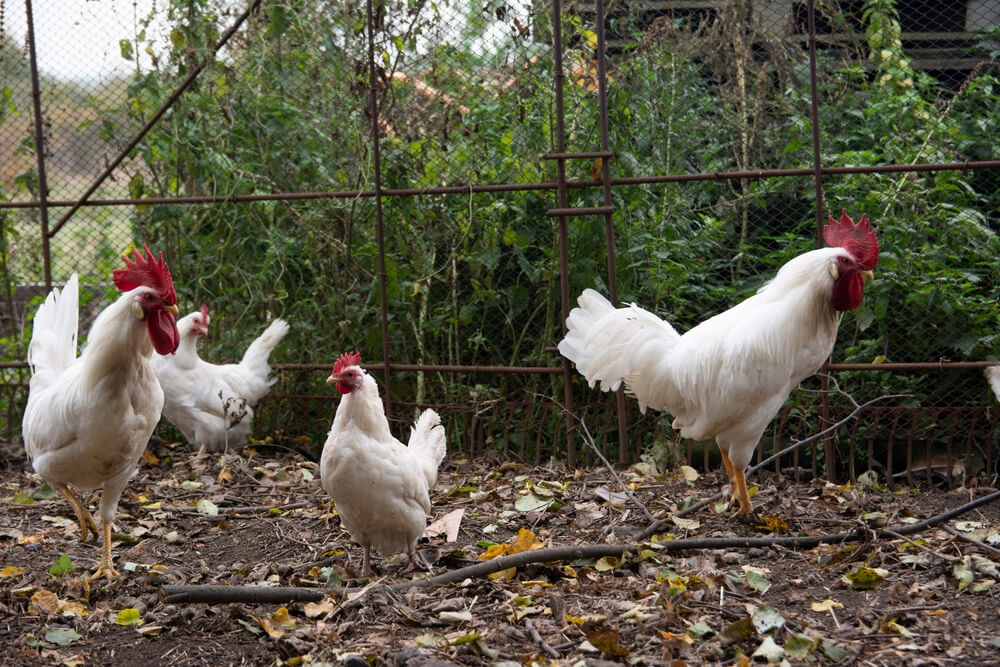
Another popular variety of Leghorn chickens is the Brown Leghorn. This variety is known for its rich brown plumage and active disposition. Brown Leghorns are also highly productive layers, producing around 270 eggs per year on average. They are also relatively lightweight, with roosters weighing around 5-6 pounds and hens weighing around 4-5 pounds.
In terms of temperament, Leghorn chickens are known to be active and alert. They are also hardy birds that can tolerate a wide range of weather conditions. They are a great choice for backyard flocks and small homesteads.
One of the most notable characteristics of the Leghorn is their ability to lay eggs consistently throughout the year, making them a great choice for those looking for a steady supply of eggs. They are also relatively lightweight and fast-growing, making them a great choice for meat production.
Maran
The Marans chicken is a dual-purpose breed known for its rich, dark brown eggs and flavorful meat. Recognized by the American Poultry Association in 2010, this breed is available in several different varieties.
One of the most popular varieties of Marans chickens is the Copper Black Marans. This variety is known for its dark copper-colored plumage and docile temperament. Copper Black Marans are highly productive layers, producing around 200-300 eggs per year on average, with a distinctive dark brown color. They are also relatively heavy, with roosters weighing around 8-9 pounds and hens weighing around 6-7 pounds.
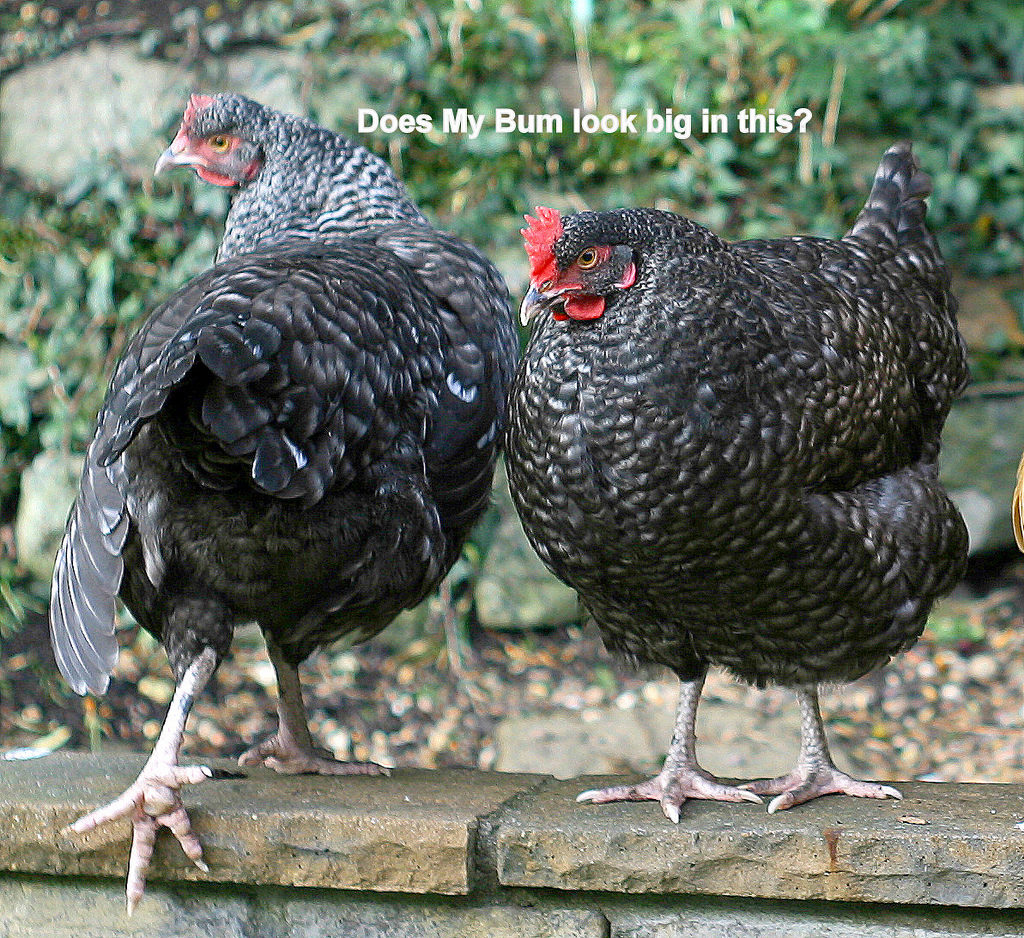
Another popular variety of Marans chickens is the Cuckoo Marans. This variety is known for its mottled plumage and docile temperament.
In terms of temperament, Marans chickens are known to be docile and easy to handle. They are also hardy birds that can tolerate a wide range of weather conditions, such as Colorado temperature. They are a great choice for backyard flocks and small homesteads.
One of the most notable characteristics of the Marans is their distinctive, dark brown eggs that are highly sought after by bakers and chefs. They are also known for their flavorful meat, making them a great choice for those looking for a dual-purpose breed.
Welsummers
The Welsummer chicken is a breed of chicken that is known for its unique and rich-colored eggs, which range from a deep orange to a dark chocolate color. They are a hardy, dual-purpose breed, meaning they are suitable for both egg production and meat production.
Welsummers are considered to be good layers, with an average of around 200 eggs per year. Their eggs are medium to large in size and have a distinctive, rich color. They are also known to be good foragers and do well in a free-range environment.
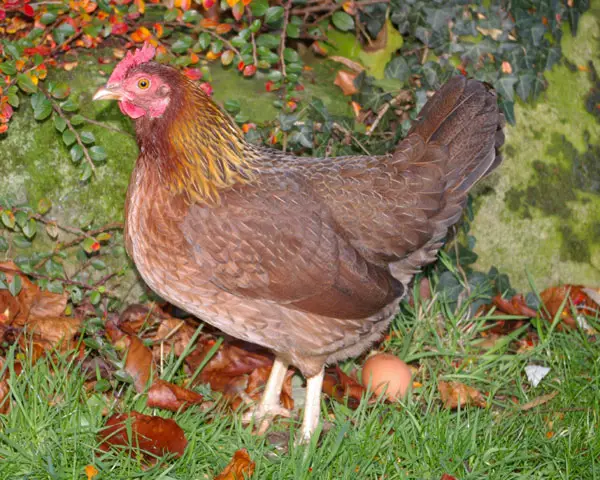
In terms of temperament, Welsummers are known to be friendly and easy to handle. They are generally docile and make good pets for backyard flocks.
Welsummers come in one standard variety.
In terms of weight, Welsummers are considered to be a medium-sized breed, with roosters weighing around 7.5 pounds and hens weighing around 6.5 pounds.
Welsummers were first recognized by the American Poultry Association in 1991.
How many chickens can I have in Colorado?
The number of chickens that you can have in Colorado may vary depending on the specific regulations of the city or county where you live.
Some municipalities may have specific zoning laws that dictate the number of chickens that can be kept on a property, while others may have no regulations at all. It’s best to check with your local government to find out what the laws are in your area.
Typically, people in Colorado can keep backyard chickens with a small flock of 6-10 birds, but again, it’s best to check with your local authorities.
Here are a few examples of laws regarding backyard chickens in some of the major cities in Colorado:
- Denver CO: Denver allows residents to keep up to 8 chickens (no roosters) on their property, as long as the coop is at least 15 feet away from any neighboring residence and the chickens are kept in a clean and humane manner.
- Boulder: Boulder allows residents to keep up to 8 chickens on their property, as long as the coop is at least 10 feet away from any neighboring residence and the chickens are kept in a clean and humane manner.
- Colorado Springs: Colorado Springs allows residents to keep up to 10 chickens(no roosters) on their property, as long as the coop is at least 25 feet away from any neighboring residence and the chickens are kept in a clean and humane manner.
- Fort Collins: Fort Collins allows residents to keep up to 6 chickens (no roosters) on their property, as long as the coop is at least 10 feet away from any neighboring residence and the chickens are kept in a clean and humane manner.
- Lakewood: Lakewood allows residents to keep up to 6 chickens on their property, as long as the coop is at least 10 feet away from any neighboring residence and the chickens are kept in a clean and humane manner.
Can chickens survive in Colorado?
Caring for chickens in Colorado’s climate requires attention to a few key factors.
First, it is important to provide adequate shelter for your chickens. In Colorado, the summers can be hot and dry, and the winters can be cold and snowy. Chickens need a coop that is well-ventilated to keep them cool in the summer, but also protected from the cold and wind in the winter. A coop with a south-facing window will allow the chickens to get sunlight during the colder months, which is important for their overall health.
Second, chickens need access to clean water and feed at all times. During the summer, make sure to provide plenty of water to keep your chickens hydrated, and during the winter, make sure that their water does not freeze. Chickens also need a balanced diet to maintain their health and egg production. It’s a good idea to provide a variety of different types of feed, including a protein-rich feed for egg-laying hens and a higher protein feed for growing birds.
Third, it’s important to protect chickens from predators. Foxes, raccoons, and birds of prey can be a problem in Colorado. Make sure that the coop and run are secure and that the chickens have a safe place to roost at night. Electric fencing can also be used to keep predators out.
Finally, make sure to keep the coop and run clean. Chickens can be prone to various diseases and parasites, so regular cleaning and sanitizing are essential to maintain their health.
As a general rule, it’s always a good idea to check with your local laws and regulations before keeping chickens in Colorado. Some cities may have specific laws or restrictions on keeping chickens. Additionally, it’s also important to consider the neighbors and community when keeping chickens as some people may not be fond of the idea.
Do I need a license to sell eggs in Colorado?
In Colorado, if you’re selling eggs, you must have a food handler’s card and comply with the state’s food safety regulations. The Colorado Department of Agriculture regulates the sale of eggs in the state and requires that all eggs sold in Colorado be graded and packaged according to specific standards.
If you are selling eggs that are produced on your own property, you are considered a “cottage food producer” and are exempt from many of the requirements that commercial egg producers must follow. However, you must still have a food handlers card and register with the local health department.
Why are eggs so expensive in Colorado?
A few possible reasons could include:
- High demand for eggs in the state: If there is a high demand for eggs in Colorado and not enough supply to meet that demand, prices may go up.
- High feed costs: Feed is one of the main expenses for chicken farmers, and if feed costs are high, farmers may need to charge more for their eggs to make a profit.
- High labor costs: Running a chicken farm requires a lot of work, and if labor costs are high in Colorado, farmers may need to charge more for their eggs to make a profit.
- Transportation costs: If eggs need to be transported a long distance to reach Colorado, this can add to the cost of the eggs.
- Government regulations: Government regulations related to egg production and sale can also affect the cost of eggs.
It is important to note that this is a complex issue, and there may be many other factors at play that affect the price of eggs in Colorado.
Conclusion
In conclusion, keeping chickens in Colorado can be a rewarding and sustainable experience. However, it’s important to be aware of local laws and regulations, as well as the specific needs of the chickens in the Colorado climate.
When it comes to egg production, different breeds of chickens will have varying levels of productivity, with some breeds being better suited for backyard flocks.
While there may be factors that can affect egg prices, such as feed costs, there is currently no egg shortage in Colorado.
Additionally, it’s important to note that a license may be required to sell eggs, depending on the location and scale of the operation. With proper care and management, raising chickens in Colorado can be a great way to provide fresh, healthy eggs for your family and community.
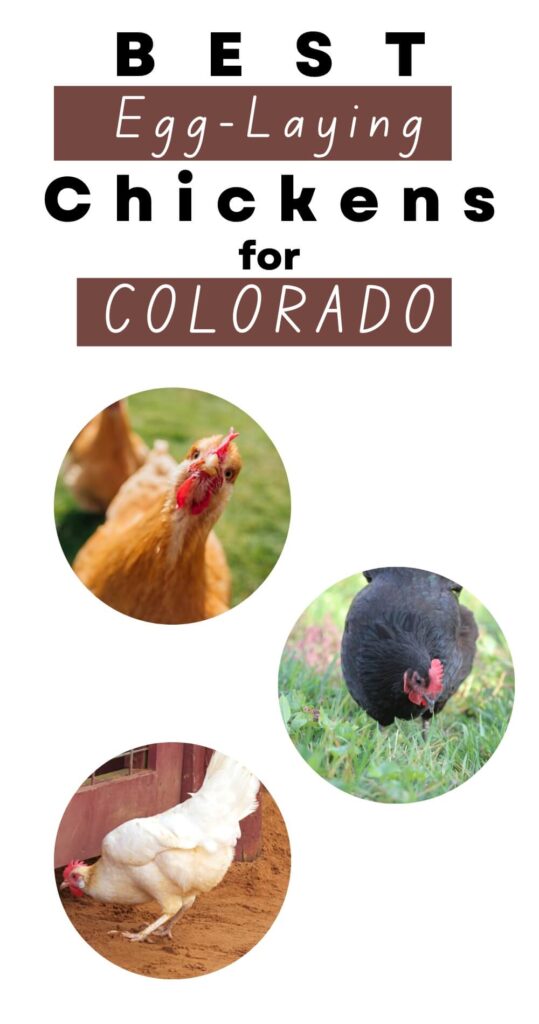
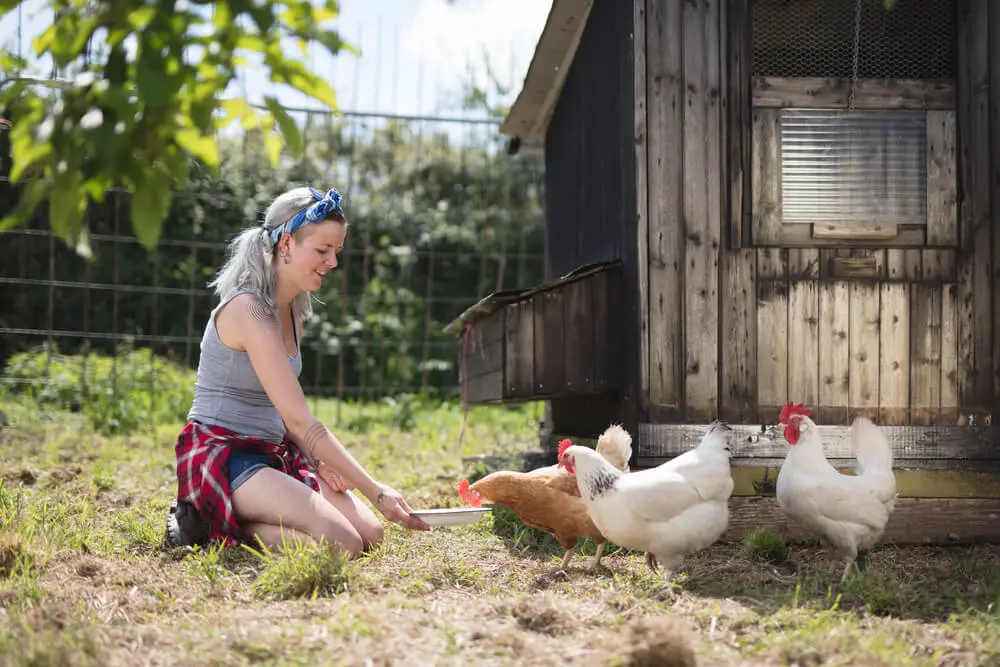
Shannon Stansberry has been engaged in the business of raising chickens for more than 12 years. In 2016, she accomplished the Agriculture & Natural Resources program at Mt. San Antonio College. At present, she tends to more than 80 chickens on her 4-hectare farm. Shannon regularly shares her insights and experience on how to raise healthy and contented chickens on the platform Typesofchickens.com
